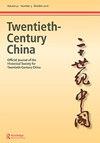Visualizing Folk Love Songs: De/politicization of Sinicized Cartoons in North China under Japanese Occupation
IF 0.4
Q1 HISTORY
引用次数: 0
Abstract
Abstract:During the War of Resistance against Japan (1937–1945), cartoons constituted an important type of cultural production in Japanese-occupied China. Most scholarship focuses on the political stances shown in such cartoons. However, this article explores Chinese cartoons that seldom directly addressed political issues in wartime North China. In 1935, Zhang Guangyu created the first Folk Love Songs cartoon, which has been seen as representative of Sinicized cartoons, emphasizing the national characteristics shown in Chinese folk culture. With changes in formal and ideological matters, Folk Love Songs cartoons continued to appear in Japanese-occupied North China, featuring quotidian topics. This article argues that, by visualizing everyday life, Folk Love Songs cartoons displaced and de/politicized (depoliticized and simultaneously repoliticized) the national characteristics embedded in prewar Sinicized cartoons. The motif showcases the complexity of wartime cultural production that was not totally occupied by political propaganda.民间情歌的形象化:日据时期华北漫画的去政治化
摘要:抗战时期(1937—1945),漫画是日据中国重要的文化生产形式。大多数学术研究都集中在这类漫画中表现出的政治立场上。然而,这篇文章探讨了中国漫画很少直接涉及战时华北的政治问题。1935年,张光裕创作了第一幅民间情歌漫画,被视为中国化漫画的代表,强调了中国民间文化的民族特色。随着形式和意识形态的变化,日本占领下的华北地区继续出现民间情歌漫画,以日常话题为特色。本文认为,民间情歌漫画通过对日常生活的形象化,将战前中国化漫画所蕴含的民族特征进行了置换和去政治化(去政治化和同时再政治化)。该主题展示了战时文化生产的复杂性,而这些生产并没有完全被政治宣传所占据。
本文章由计算机程序翻译,如有差异,请以英文原文为准。
求助全文
约1分钟内获得全文
求助全文

 求助内容:
求助内容: 应助结果提醒方式:
应助结果提醒方式:


